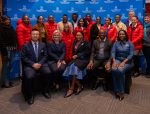The Ministry of Fisheries and Marine Resources has said that currently, there are eleven active Mariculture farmers employing about 205 employees.
Namibia’s aquaculture has two sub-sectors: freshwater aquaculture and marine aquaculture, popularly known as Mariculture. The Mariculture subsector, which is private oriented for commercial trade, produces the most highly valued species, such as: oysters, abalone, mussels, and seaweed.
On the other hand, freshwater aquaculture is a government-driven sector that produces African catfish and tilapia mostly for food security at the household level in rural areas.
“To date, the Ministry supports around 190 small-scale fish farmers. Aspiring fish farmers can visit any of our regional offices, our staff members will facilitate by inspecting the site where you intend to put your fish ponds, testing the quality of the water you intend to use, and providing you with the fingerlings of fish species you aim to farm with, at a small cost of 20 cents per tilapia and 30 cents for catfish fingerlings,” said Silvia Makgone, Deputy Minister of Fisheries and Marine Resources, last week.
She went on to say that the Ministry will monitor progress and also assist fish farmers during the harvesting period, all of which is free of charge.
“In addition, the Ministry facilitates aquaculture development through the issuing of aquaculture licenses and import or export permits for live aquatic organisms or aquaculture products in both local and international markets. To date, we have issued more than 148 aquaculture licenses. It is important to note that there are also exemptions for aquaculture licenses for small-scale fish farmers who intend to produce less than 10 tonnes per year of local fish species. To apply for an aquaculture license, one has to submit a completed application form (the application form can be downloaded on the Ministry’s website) or it can be obtained at any MFMR offices countrywide,” the deputy minister said.
Before submitting application forms for aquaculture licenses, documents that should accompany the application form in terms of the Aquaculture Act include a copy of a company registration from BIPA, a copy of an environmental impact assessment scoping report, a copy of an environmental management plan, a copy of an environmental clearance certificate, a copy of a business plan, a copy of land or site approval or written consent from the owner, a copy of approval for water use, a copy of a public notice published in a local newspaper, and a completed application form in full.
“If the application pack is incomplete, the applicant will be notified within 3 days and will be requested to submit all outstanding requirements within 5 working days. If the applicant fails to submit the outstanding requirement within the prescribed timeframe of 5 working days, such an application will not be assessed. This means the application will not be assessed before the applicant submits all the requirements for her/his application.
“If the application has been accompanied by all required documents, the application will be screened, and the applicant will be notified within 5 working days whether his or her application meets all requirements or not. An application that fails to meet all the requirements will not be subjected to a full assessment. We will inform the applicant to submit the required document within 5 working days.
In essence, the applications that meet all the requirements will be assessed within 10 working days, and the findings will be submitted to the Minister for consideration. The Minister will notify the applicant and issue an aquaculture license within 3 working days. If all the requirements are met at the first submission, the entire process takes about 20–25 working days.
“It is worth mentioning that the Directorate of Aquaculture and Inland Fisheries recently launched the Directorate’s Customer Service Charter, which can be found on our website.
“With this Charter, we want our customers, especially the aspiring fish farmers, small-scale and commercial fish farmers, and the Namibian people at large, to be informed and educated about our operations and services under Aquaculture, as well as to know their entitlement to services that they should receive from us. In the charter, we further highlight complaint procedures if you are not happy or satisfied with the quality of service from the Directorate. I urge the Namibian people to take advantage of the services provided by the government and to actively complain through formal procedures in order to hold us accountable,” Makgone explained.










